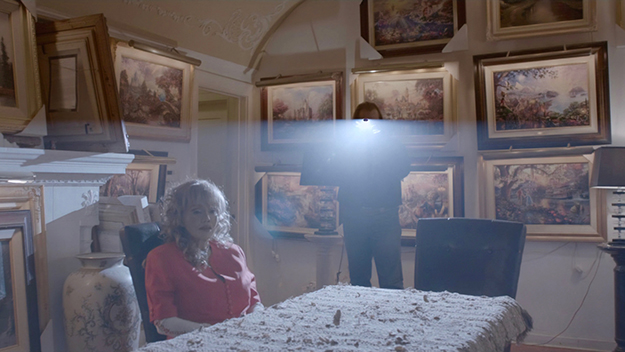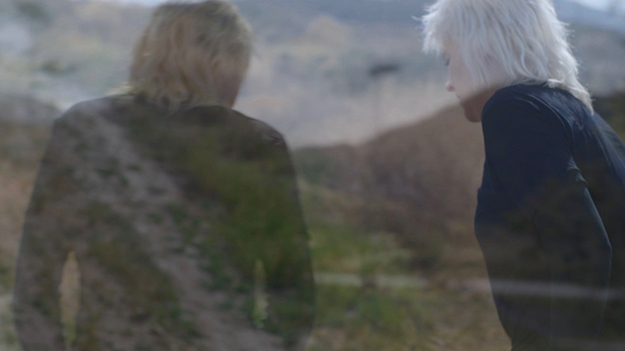“It’s just interested in you, really,” Jeffrey Peixoto said at one point during our interview about his film Over the Rainbow, a galvanizing world premiere at the latest True/False Film Fest. Peixoto’s mesmerizing movie enters the mindsets of people with direct experience of Scientology, while also bringing in perspectives from a cognitive psychologist, an archival librarian, and, through shots that revitalize the person-on-the-street cutaway, other sentient earthlings. (Brief shout-out here to Franz Anton Mesmer, 18th-century proselytizer for “animal magnetism” and etymological origin of mesmerize.) Yet rather than seeking to whip back the curtain in a sensational way—Peixoto says there has been a response from Scientology but preferred not to elaborate—Over the Rainbow enacts a kind of sensorial empathy. We are drawn into the subjects’ lived dreams of reality through extended, disarming interviews and a heady brew of montage, slow-motion, and the music of HTRK. It’s a profound, productively unsettling, and extremely accomplished film, that, as the director states, is less about its ostensible subject than it is an extended reflection in the truest sense. How did it feel to premiere your film finally? It felt insane. I’ve been working on that movie for so much of my adult life that it feels like the inside of my brain is being projected on screen for strangers to watch. We started shooting about seven or eight years ago. I was obsessed with Scientology, but the only thing that I could find about it was from outsiders, media reports and stuff. I wanted to know what was going on inside and what it felt like inside. At a certain point I realized, after I’d watched all the movies and read all the books and articles about it I could, that I would have to do it myself if I wanted to see the movie that I wanted to watch. What weren’t you getting from these other accounts of Scientology? Almost everything other-izes Scientologists in a way, and I just don’t find that very illuminating. What was the challenge of this subject matter? The challenge of the film was to take such a loaded subject and show you something new. The challenge was taking a subject matter that people have such baggage about and preconceptions. The film basically posits, “What if Scientology is real?” It may be absurd on its face, but I wanted to take that part of it very seriously. How did you find the people you speak with? I went all over the country, and I talked to many, many people. And they would put me in touch with many other people. The whole time I was looking for something in those people’s eyes, in their faces, that expressed themselves and what they were searching for. I was looking for people that could articulate their hearts and minds, not only verbally but also facially. One of the most fascinating people is the woman who seemed to be born and raised into Scientology. I come from a very religious upbringing and background, so that material in the film is very personal. I wasn’t raised as a Scientologist. It’s not one-to-one for me. But I was very much interested in what happens to children when they’re raised in a strong belief system. The questions you’re asking are the ones that are on my mind. The movie is my best attempt at the answers. Her big objection comes when the precepts of Scientology seemed to be getting in the way of open emotional dialogue with her father. Was that a surprise? Well, I don’t know that humans have come up with an effective enough religion yet that totally controls their hearts and minds. We keep trying to—different iterations, some more effective and efficient than others. I could name some that are pretty widespread and pretty effective, but that is the aim of any belief system: totality. What makes the film effective, I think, is how exacting and fully realized the audiovisual environment you create is. Every shot in the film is meaningful because when you are religious you believe everything has meaning. I was thinking the other day about paranoia: to me, paranoia is the ultimate religious belief system. William Gibson said something like, have you ever considered the relationship between religious conversion and clinical depression? I think that clinical depression is the absence of meaning or the inability to create meaning in your life, and then paranoia and religious belief is like a surfeit of meaning, excessive. When you’re religious, everything you see has meaning, you fit it into your reality. So, yes, the film attempts to put you in that visual and emotional environment. You’re so good at capturing people in some kind of private moment, whether it’s those you interview or the cutaways of people walking down the street, thinking to themselves. What kind of lenses were you using? It’s an Angénieux Optimo 24-240 lens which we shot almost the entire film on. It allows you to be a great distance from someone but still be very close on them, so they know they’re being observed but you’re not in their face. The first thing that cinema does is it looks at people, and that’s all I wanted to do was really look at people. Were you using that lens for the sit-down interviews? I was, because I don’t like the camera to be that close to the person. I like to have a conversation with them and to maintain the visual fabric of the film. It’s a huge camera and a huge lens, it looks a little silly, it doesn’t look very intimate, and it definitely feels different to people. The weight of the camera—people take it seriously when you have a big camera, they [perk] themselves up a little bit and it becomes a more formal enterprise. I like that as well. You want people giving you everything they’ve got. How many hours did you shoot? The movie is less than 75 minutes but has the weight of something greater. Hundreds and hundreds of hours of footage. It was years that we tried to distill down to the most essential core. I think it was Charles Dickens that said that speed and density are the essential values or tools… I want people to feel there are hundreds and hundreds of hours, but the film should be just the tip of the iceberg. Seven-eighths of it should be underwater, because you can feel that when you watch.
At True/False, you talked about Alan Pakula when I asked what filmmakers were on your mind. Any others? I wondered if Errol Morris was another. The influences were indirect for this movie, so they were more W.G. Sebald, painters like Allenbach… It was more about process and feelings with those influences. Errol Morris is a great filmmaker certainly and maybe I arrived somehow in his territory, but in terms of the films I was thinking about, there weren’t any documentaries. I don’t really like documentaries that much. It was more Klute, that’s a big one. The Insider—Michael Mann was probably in my mind a lot for this movie. Zodiac. And Chris Cunningham. He is my favorite. I’d be hard pressed to tell you exactly how it relates to this film I just made, but there’s something about the cleanness of his work and the elegance of it that was certainly aspirational. How would you distinguish between fiction and nonfiction approaches? What W.G. Sebald was doing in literature was a real eye-opener for me. He was certainly a guy [who was helpful] for this project in that he was taking nonfiction material but crafting it into something very personal and something that aspired to be a sort of ecstatic truth, rather than just a reportage or documentary. I studied briefly at NYU, fiction film production. I just don’t know that you can make fiction films anymore. People are so concerned whether the form is dying. I think it might already be gone. Fiction is predicated on the suspension of disbelief. But I don’t know anyone who suspends their disbelief anymore. We barely believe what’s real. I liked the audience question after one screening, about how the movie posits Scientology as a kind of hyperbolic version of modernity. I love that stuff. That’s where I live. You could say that religions evolve and adapt to the times they’re in, or strive to be more and more cutting-edge—Christian megachurches that have “rock ’n’ roll” worship… I think that the film presents Scientology as a very contemporary religion. But what was striking to me over the course of making the film was not how outrageous Scientology was, but how normal it is. The hierarchy of its levels, the contractual language, it all sounds quite capitalistic. It is a strikingly American religion. Because it is religion as quantified spirituality. There’s nothing more American than working your way up a ladder. And there’s nothing more American than the hope that you could become enlightened if you just follow the right path or take the right steps. We just want the steps laid out for us. With me, it is not about Scientology. This is the same film I would have made if there were video cameras to document the early Christians. Or the first circle of Latter Day Saints, Joseph Smith in the 1830s. It’s about much deeper and darker things. There is something mesmerizing about the music you use. It has this murmuring quality. “Murmuration” was a big word when we were working. I wanted music that felt like you had found an internal Scientology VHS tape from the 1980s. Something from inside there. You do use footage that looks like it’s from an old VHS tape, to great effect—a repeated clip of a girl dancing in circles in front of other kids. What is that? It felt like a revival of some sort. It’s from her schooling. It’s a dance presentation that they gave to some outsiders, in the early 1990s. If you feel that’s a revival… that’s right. That is similar to footage I have from my childhood, totally different, but there’s some common tropes. Also fascinating are the images from the New Horizons Academy, the school that someone else in the movie runs. The children’s faces are blurred out, to preserve their anonymity I suppose, but it reminds one of a nightmare in a horror movie. I’m not sure if I should say this… Yeah, the movie is a quiet horror film. That’s sort of how it feels like to me. I hope people get whatever they get out of it. That raises the question, what is the horror then? Is it consciousness itself? If you know what I mean. I do, I do, and I know what it is. It is something very specific. And I can’t tell you. Nicolas Rapold is the editor-in-chief of Film Comment and hosts The Film Comment Podcast.

